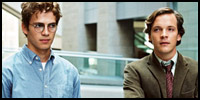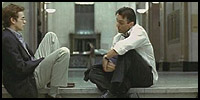
 |
|
Shattered Glass (2003) Cast: Hayden Christensen, Peter Sarsgaard, Chloe Sevigny, Melanie Lynskey, Hank Azaria, Steve Zahn, Rosario Dawson, Chad Donella, Luke Kirby, Jamie Elman, Mark Blum, Russell Yuen, Linda E. Smith, Simone Elise-Girard 2003 – 94 minutes Rated: Reviewed by Dustin Putman, November 23, 2003.  In today's media-obsessed culture, how much trust can a reader put into the news—any news—when even the leading in-flight magazine of Air Force One produces stories that are not just fabricated, but completely and utterly false? And how did such stories ever reach print when they were supposedly fact checked a number of times before publication? These are the key question stirring at the heart of "Shattered Glass," the riveting, thought-provoking directing debut of Billy Ray (screenwriter of 2002's "Hart's War").
In today's media-obsessed culture, how much trust can a reader put into the news—any news—when even the leading in-flight magazine of Air Force One produces stories that are not just fabricated, but completely and utterly false? And how did such stories ever reach print when they were supposedly fact checked a number of times before publication? These are the key question stirring at the heart of "Shattered Glass," the riveting, thought-provoking directing debut of Billy Ray (screenwriter of 2002's "Hart's War").
 "Shattered Glass" is something of a bio film, the true story of Stephen Glass (Hayden Christensen), the 24-year-old journalist of The New Republic who, in the three years he worked there from 1995 to 1998, fabricated or completely made up 27 of the 41 stories he wrote. As the false news stories arrived one after the other, Glass' editor, Chuck Lane (Peter Sarsgaard), and loyal co-workers, including Caitlin (Chloe Sevigny), Amy (Melanie Lynskey), and David (Chad Donella), were left clueless until an on-line news site discovered the fraud and exposed Glass and the supposedly reliable magazine.
"Shattered Glass" is something of a bio film, the true story of Stephen Glass (Hayden Christensen), the 24-year-old journalist of The New Republic who, in the three years he worked there from 1995 to 1998, fabricated or completely made up 27 of the 41 stories he wrote. As the false news stories arrived one after the other, Glass' editor, Chuck Lane (Peter Sarsgaard), and loyal co-workers, including Caitlin (Chloe Sevigny), Amy (Melanie Lynskey), and David (Chad Donella), were left clueless until an on-line news site discovered the fraud and exposed Glass and the supposedly reliable magazine.
 As played by Hayden Christensen, who rises above his constricting role as Anakin Skywalker in "Star Wars: Episode II—Attack of the Clones" and makes good on the promise of 2001's "Life as a House," Stephen Glass is a cunning, manipulative mastermind whose main goal in life is to be loved by everyone, no matter how much he has to lie to achieve this. It is quite a striking performance; Christensen presents Glass as an eager-to-please, humble kid who has started to reach fame through the vibrant writing of funny and extravagant—yet eerily plausible—stories. When editor Chuck Lane catches wind of the on-line magazine's investigation, he decides to do some research on his own. No matter how flimsy Glass' truth becomes, he always seems to have a quick excuse or comeback to explain things away. Before long, however, Glass' lies start to topple, like a house of cards that have been stacked too high.
As played by Hayden Christensen, who rises above his constricting role as Anakin Skywalker in "Star Wars: Episode II—Attack of the Clones" and makes good on the promise of 2001's "Life as a House," Stephen Glass is a cunning, manipulative mastermind whose main goal in life is to be loved by everyone, no matter how much he has to lie to achieve this. It is quite a striking performance; Christensen presents Glass as an eager-to-please, humble kid who has started to reach fame through the vibrant writing of funny and extravagant—yet eerily plausible—stories. When editor Chuck Lane catches wind of the on-line magazine's investigation, he decides to do some research on his own. No matter how flimsy Glass' truth becomes, he always seems to have a quick excuse or comeback to explain things away. Before long, however, Glass' lies start to topple, like a house of cards that have been stacked too high.
 If there is a flaw in the character treatment Stephen Glass receives in "Shattered Glass," it is that he is such a convincing liar that it becomes difficult to believe anything he says, does, or feels. In a climactic confrontation better Stephen and Chuck, Stephen is so distraught that he sheds a tear. The problem is that the viewer is not sure if his actions are, for once, genuine, or simply another step toward being a great actor. Had the film delved more deeply into Stephen's personal life and psyche, this confusion might have been clarified. Ultimately, the way he is developed as a character is akin to a double-edged sword, because, just as the viewer, no one who worked at The New Republic could ever figure out what the truth was.
If there is a flaw in the character treatment Stephen Glass receives in "Shattered Glass," it is that he is such a convincing liar that it becomes difficult to believe anything he says, does, or feels. In a climactic confrontation better Stephen and Chuck, Stephen is so distraught that he sheds a tear. The problem is that the viewer is not sure if his actions are, for once, genuine, or simply another step toward being a great actor. Had the film delved more deeply into Stephen's personal life and psyche, this confusion might have been clarified. Ultimately, the way he is developed as a character is akin to a double-edged sword, because, just as the viewer, no one who worked at The New Republic could ever figure out what the truth was.
 As concentrated and effective as Hayden Christensen is, Peter Sarsgaard (2002's "K-19: The Widowmaker") is the standout in the cast. Sarsgaard is absolutely electrifying as editor Chuck Lane, who wants to support and trust Stephen, but reaches a point where he realizes he no longer can. It is Sarsgaard whom the audience follows, because it is he who is discovering information along with them, and his turn is a complex, multifaceted one worthy of Oscar consideration.
As concentrated and effective as Hayden Christensen is, Peter Sarsgaard (2002's "K-19: The Widowmaker") is the standout in the cast. Sarsgaard is absolutely electrifying as editor Chuck Lane, who wants to support and trust Stephen, but reaches a point where he realizes he no longer can. It is Sarsgaard whom the audience follows, because it is he who is discovering information along with them, and his turn is a complex, multifaceted one worthy of Oscar consideration.
 In supporting roles, Chloe Sevigny (2000's "American Psycho") and Melanie Lynskey (2002's "Sweet Home Alabama") provide able support as Stephen's co-workers, while Steve Zahn (2001's "Joy Ride") is very good in the somewhat underutilized role of Adam Penenberg, the on-line magazine writer who exposed Stephen's fraudulence. The talented Rosario Dawson (2002's "25th Hour") also briefly turns up as Andie, Adam's cohort in unmasking Stephen's lies.
In supporting roles, Chloe Sevigny (2000's "American Psycho") and Melanie Lynskey (2002's "Sweet Home Alabama") provide able support as Stephen's co-workers, while Steve Zahn (2001's "Joy Ride") is very good in the somewhat underutilized role of Adam Penenberg, the on-line magazine writer who exposed Stephen's fraudulence. The talented Rosario Dawson (2002's "25th Hour") also briefly turns up as Andie, Adam's cohort in unmasking Stephen's lies.
 At a fast 94 minutes, the picture could have benefitted from an added ten to fifteen minutes of development. At the same time, such a criticism might only stem from how engaging the story and Billy Ray's astute direction actually are. "Shattered Glass" is a thoroughly fascinating examination of a shameful footnote in journalistic history that many people probably wish to forget.
At a fast 94 minutes, the picture could have benefitted from an added ten to fifteen minutes of development. At the same time, such a criticism might only stem from how engaging the story and Billy Ray's astute direction actually are. "Shattered Glass" is a thoroughly fascinating examination of a shameful footnote in journalistic history that many people probably wish to forget.
|
© 2003 by Dustin Putman |














